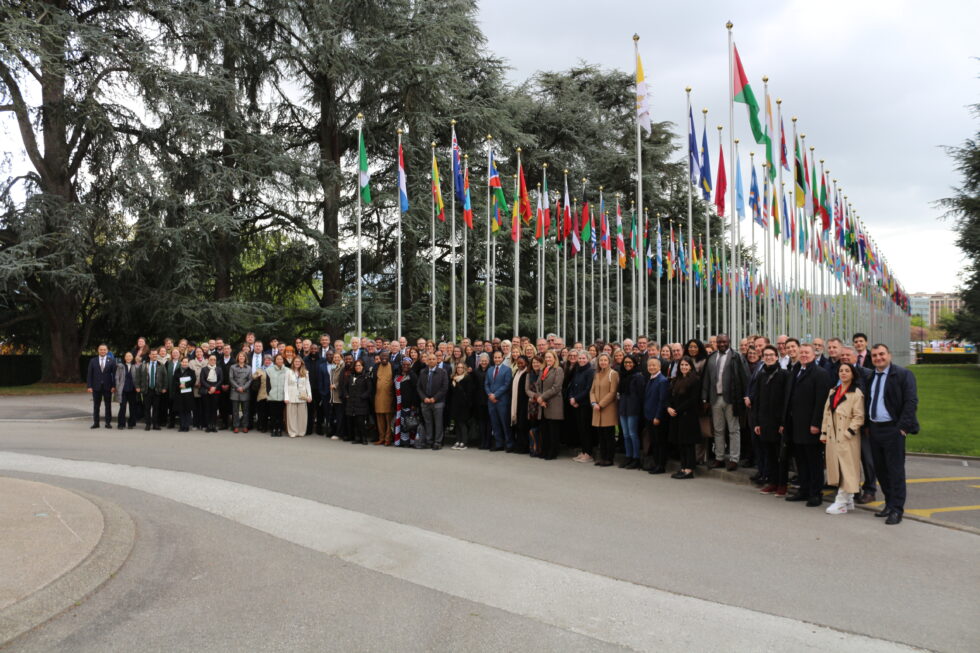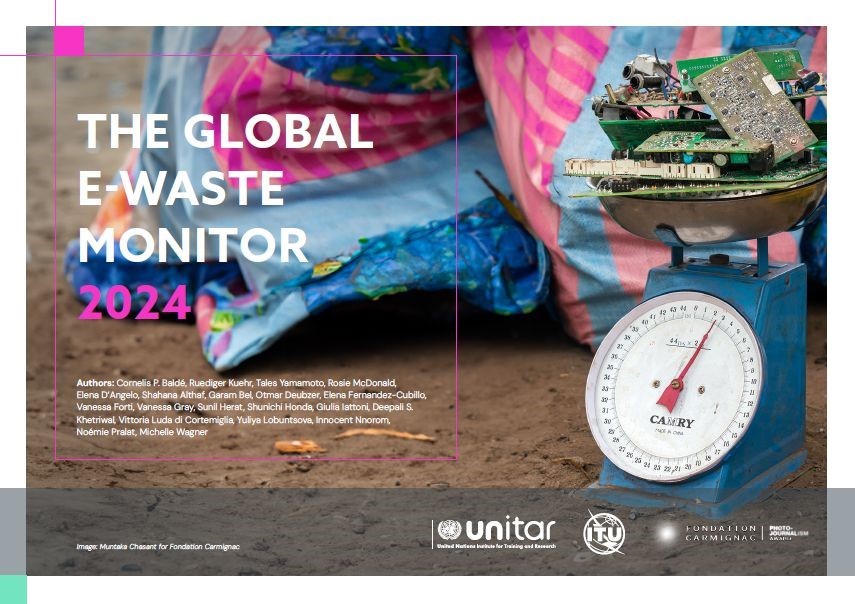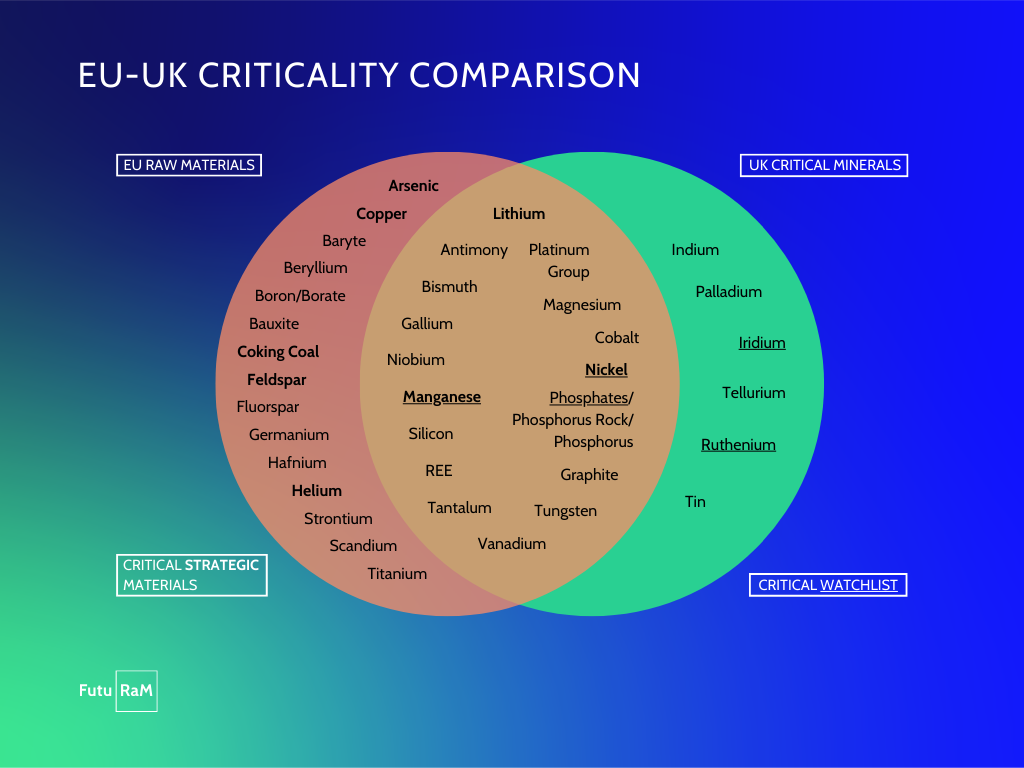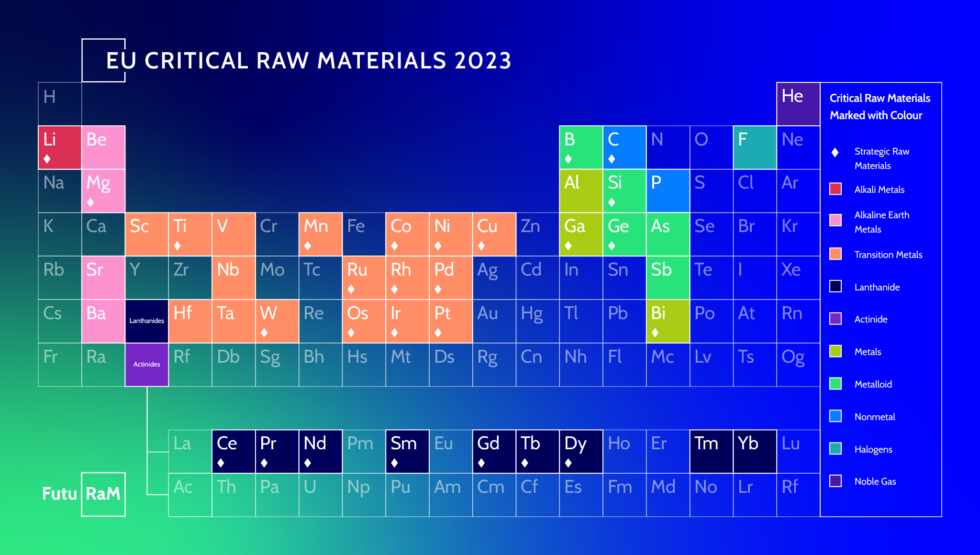Critical raw materials (CRMs) are economically and strategically important for the European economy but have a high risk associated with their supply. In many instances, CRM primary extraction is limited to a few locations outside of Europe. To achieve a transition toward a decarbonised world, secondary raw materials (SRMs) need to play an increasing role and help to diversify the supply sources of CRMs.
FutuRaM, a Horizon Europe funded project, is establishing a methodology, reporting structure, and guidance to improve the raw materials knowledge base up to 2050. It will integrate SRM and CRM data to model the current stocks and flows, and further develop, demonstrate and align SRM recovery projects with the United Nations Framework Classification (UNFC) for Resources to enable the commercial exploitation of SRMs and CRMs by manufacturers, recyclers, and investors. FutuRaM will focus on six waste streams: batteries; electrical and electronic equipment; vehicles; mining; slags and ashes; and construction and demolition.

UNECE Resource Management Week
The UNECE Resource Management Week 2024 was the first major, international moment to discuss how the requirements in the Regulation must be put into practice since the adoption of the Critical Raw Materials Act by the European Parliament and the Council of the European Union to discuss how the requirements in the Regulation must be put into practice.
Signifying the valuable role FutuRaM is playing in modelling critical raw materials in Europe, our team of experts travelled to Geneva to discuss a range of topics such as coordinated activities for the implementation of UNFC and progress made in mining wastes and end-of-life secondary raw materials.

Consortium Meeting in Porto
Upon the invitation of SPI, project partners headed to beautiful Porto for FutuRaM's fifth consortium meeting.
Outlining crucial next steps and the project's collaboration with DG GROW on the implementation of the Critical Raw Materials Act, Kees Baldé from UNITAR and James Horne from the WEEE Forum set the the tone of the meeting. Spanning three days, the main points of focus were on technical sessions facilitating project progress and communication between the six different waste streams.
Focussing on the certainty and ranges for the vast amount of data the project will produce, Kirsten Remmen and Matthias Rösslein from Empa guided the meeting's first session. Marc Urvois and Daniel Monfort from BRGM then gave an update of progress on the prototype secondary raw materials knowledge base which will be one of the central outputs of the project.
Focussing on stocks and flows progress and planning, our partners spent a large part of the meeting reviewing and advancing the work in this area, with our experts taking a deeper focus on each of the FutuRaM waste streams. All under the guidance of Kees Balde, Giulia Iattoni & Tales Yamamoto from UNITAR, alongside Sonia Cunha and Adrien Perello-y-Bestard from Leiden University.
Soraya Heuss from LMU gave an overview of caste study progress and introduced a discussion on product-centric and process-centric approaches to UNF while Lucia Herreras outlined the adaptation of the WEEE Forum’s RepTool for FutuRaM.
Closing the event, partners turned their focus on exploitation, discussing how to best deliver results in a financially sustainable way and ensure accessibility to the secondary raw materials knowledge base to a diverse range of users such as policy makers, industry, academia, or consultants. The workshop was delivered by Denisa Mateus (SPI), Madijd Bouzit and Daniel Monfort (BRGM), Sarah Downes (REPIC), Soraya Heuss-Aßbichler (LMU), and Pascal Leroy (WEEE Forum).

The Global E-Waste Monitor
Key FutuRaM partner, UNITAR, has been busy in other areas recently, being part of a collaboration that produces the Global E-Waste Monitor report, which presents statistics on e-waste across the world.
This year's edition notes that WEEE is not only challenging due to its hazardous nature, but also presents opportunities, containing many materials of value. Up to 60 elements from the periodic table can be found in complex electronics, ranging from precious metals including gold, silver, copper and platinum, to valuable bulky materials such as iron and aluminium, along with plastics that can be recycled. As Europe is gearing up to win the race for (critical) raw materials, WEEE management needs to become increasingly aligned with the resources extraction sector.
The Global E-waste Monitor reports that the total value of all raw materials embedded in the 62 Mt of WEEE generated worldwide in 2022 was estimated to be around 91 billion US dollars. Out of this quantity, only 22.3% was documented to be collected and properly recycled worldwide.
The remaining 77.7% of the global WEEE flows are not documented, likely dumped, incinerated, traded illegally, or recycled with substandard treatments.
UNITAR's latest report underlines that if countries could bring the e-waste collection and recycling rates to 60% by 2030, the benefits – including through minimising human health risks – would exceed costs by more than US $38 billion.

Critical Minerals and Critical Raw Materials – A Perspective on the Added Value of FutuRaM in the UK
Despite the differences in criticality definitions in the United Kingdom and EU, the approach being undertaken within FutuRaM will ensure that data can be produced which is relevant to the UK list. The data will be housed in a new Secondary Raw Material –Knowledge Base (final user-friendly name to be agreed!), giving access to UK stakeholders on historical, current and future secondary raw materials availability.
The UNFC is an international framework of relevance to the UK. FutuRaM will develop this framework and undertake case studies within the UK. The mass balance case study we are undertaking on WEEE could help to address some of the questions raised around CMs in the recent call for evidence under the WEEE Regulations review.
The UK and EU have common needs and clear strategies for improving data and intelligence. FutuRaM will help to address these needs and provides a space for European researchers to collaborate.

Tap Into Our Knowledge Base
Learn more from our experts sharing their knowledge on a regular basis on our website:
- Resource Dissipation and its Relevance to CRMs (Jair Santillan Saldivar, Audrey Philippe, and Daniel Monfort, BRGM)
- More on Critical Raw Materials (Antje Wittenberg, BGR)
- UNFC – What is the UN Framework Classification for Resources?
- Dreaming of a Perfect Circular Economy (Claude Chanson from RECHARGE)
- Unlocking To morrow’s Industries by Leveraging WEEE Deposits (Alice Bizouard from ecosystem)
- Mining Waste, Slags, Ashes, and Red Mud Deposits in the West Balkan Area (Robert Šajn and Jasminka Alijagić from the Geological Survey of Slovenia)
- De-risking for the Green and Digital Transitions in the European Union (Rafael Santos, SPI)
- Understanding Our Impacts on Society and Nature with Life Cycle Assessment (Stewart C. McDowall, Leiden University)
Join the FutuRaM Stakeholder Network
A crucial part of the FutuRaM project will be the input of stakeholders from all parts of the value chain. The project needs to be in touch with interested individuals and organisations to get their input on the many facets of the work it is undertaking. If you are involved in work on any of the focus waste streams, have an interest in CRMs and SRMs, would like to share your thoughts and experiences on the application of the UNFC for Resources methodology, or work in relevant areas of data, statistics, or investment, then we would be grateful for your input. It may be that you only want to keep in touch.




